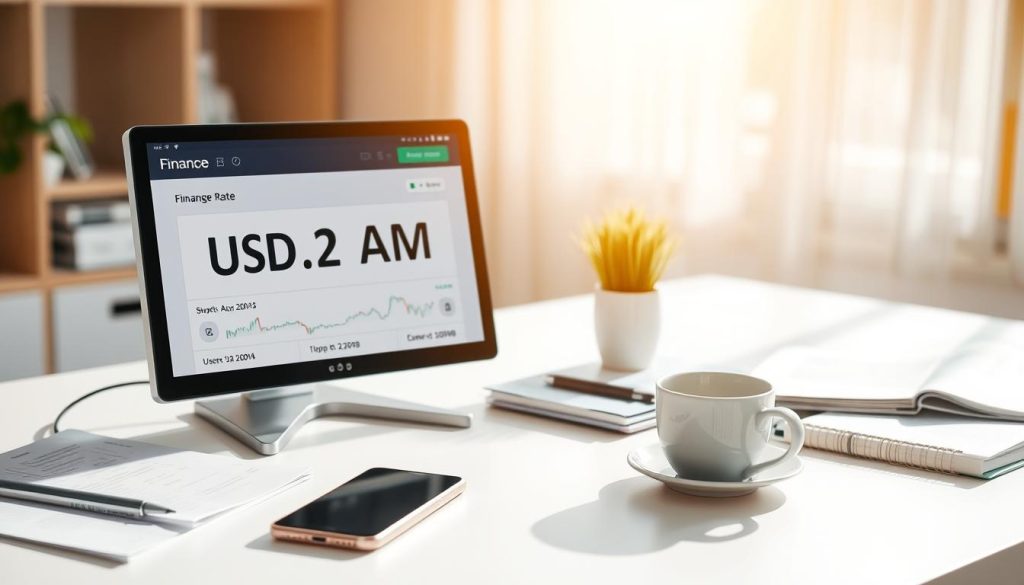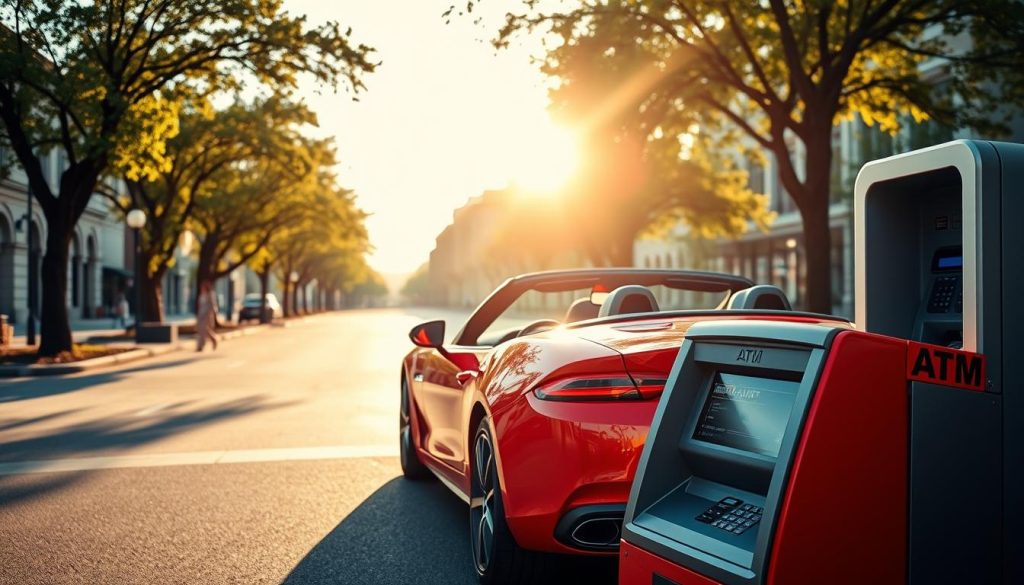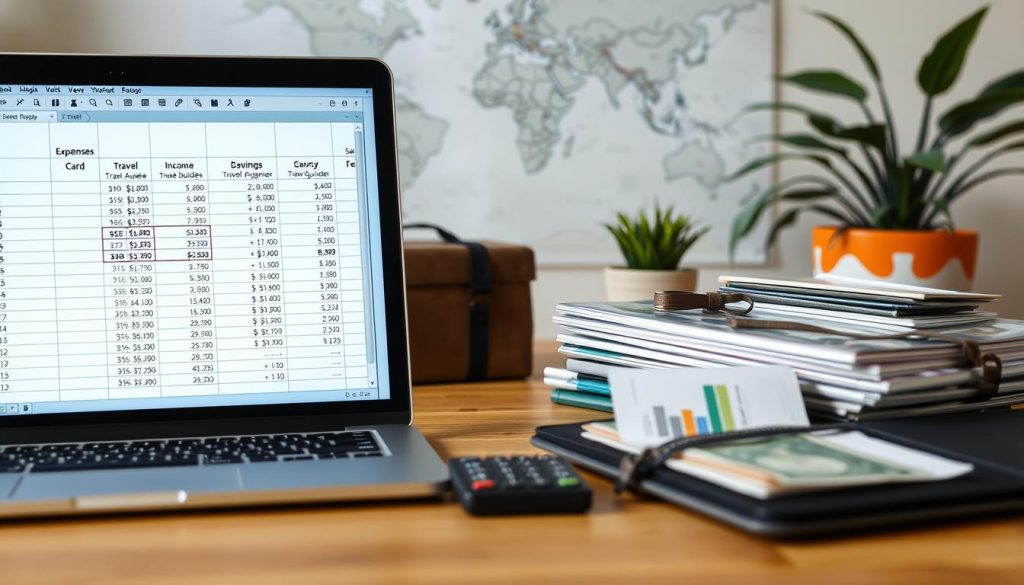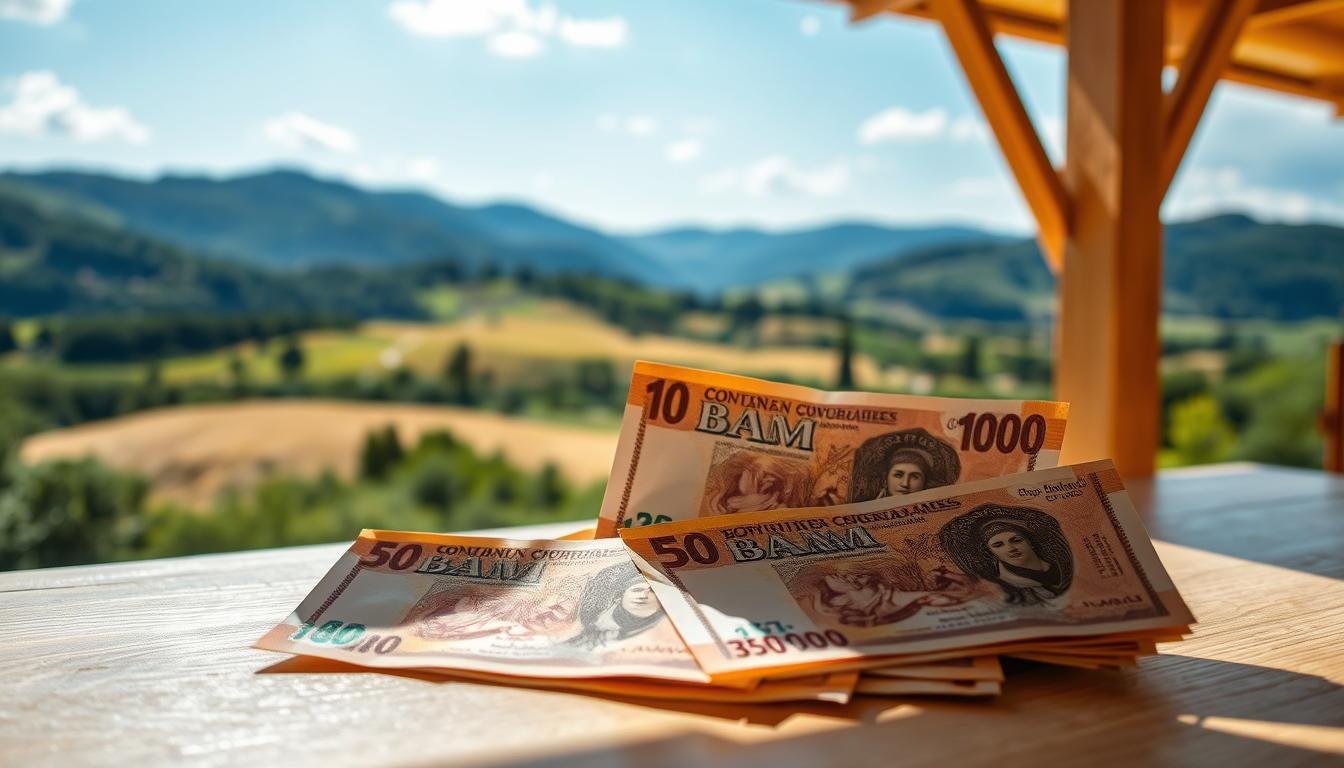Did you know that over 1.5 million tourists visit this Balkan gem annually? Managing your money effectively can make or break your trip. This guide will help you navigate the local currency, exchange rates, and payment options with ease.
Here, you’ll learn about the Convertible Mark (BAM), the official currency, and how to get the best exchange rates. Whether you prefer cash, cards, or travel debit solutions, we’ve got you covered. Avoid common pitfalls like exchanging money at airports and discover smarter alternatives.
Ready to explore this stunning destination? Let’s dive into everything you need to know about handling your finances during your travel.
Exploring Bosnia and Herzegovina’s Currency Landscape
Navigating the currency landscape in this Balkan destination is easier than you think. The official currency is the Convertible Mark (BAM), which is pegged to the euro for stability. This makes it a reliable option for travelers.
In everyday life, locals often use cash for small transactions. For example, a tip at a café or a quick purchase at a market is typically handled with bills. Carrying some BAM in your wallet ensures you’re prepared for these moments.
For larger expenses, such as hotel stays or restaurant bills, card Bosnia Herzegovina usage is common. Most establishments accept major credit and debit cards. However, be cautious of dynamic currency conversion, which can lead to unfavorable exchange rates.
Balancing cash and card usage is key. While cards offer convenience, having cash on hand is essential for smaller vendors or rural areas where card machines might not be available. This dual approach ensures you’re covered in any situation.
Here’s a tip: Always ask if there’s a fee for card transactions. Some places may charge extra, making cash the better option. By understanding these nuances, you can manage your currency Bosnia Herzegovina needs with confidence.
Understanding the USD to BAM Exchange Rate
The USD to BAM exchange rate plays a key role in your travel budget. Knowing how it works can save you money and make your trip smoother. The mid-market rate is the benchmark used by banks and currency services. It’s the rate you see on financial news sites or currency converters.
Monitoring the Mid-Market Rate
The mid-market rate is the real exchange rate between two currencies. It’s the rate banks use when trading with each other. However, when you exchange money, you’ll likely get a marked-up rate. This is how banks and providers make a profit.
Banks and currency services often add a 3% to 6% markup to the mid-market rate. This means you’ll pay more than the actual rate. To avoid high fees, monitor live rates using reputable online currency converters. Tools like Xe or TransferWise provide accurate, real-time data.

Here’s a comparison of the mid-market rate versus the rates you might receive:
| Service | Rate Offered | Markup |
|---|---|---|
| Mid-Market Rate | 1.95 BAM per USD | 0% |
| Bank Exchange | 1.89 BAM per USD | 3% |
| Airport Kiosk | 1.85 BAM per USD | 5% |
To get the best deal, avoid exchanging money at airports or tourist spots. These locations often charge the highest fees. Instead, use local exchange bureaus or withdraw cash from ATMs. Always check for hidden fees before making a transaction.
By understanding the mid-market rate and comparing options, you can find the best way to convert your money. This ensures you get the most value for your dollars during your trip.
Exchange Options: Cash, Cards, and More
Handling your finances efficiently is crucial for a smooth travel experience. Knowing your exchange options can save you time and money. Whether you prefer cash, cards, or a mix of both, understanding the pros and cons of each will help you make informed decisions.
Exchanging Before Arrival
Exchanging some USD to BAM before your trip can be a smart move. It ensures you have local currency ready for immediate expenses like transportation or meals. Online services often offer better rates than airports or tourist spots.
For example, using platforms like Wise or XE Money Transfer can lock in competitive rates. This approach saves you from the hassle of finding exchange bureaus upon arrival. It’s especially useful if you’re landing late at night or in a smaller city.
Local Exchange Bureaus and Fees
Once you arrive, local exchange bureaus are a convenient option. They are widely available in city centers and offer competitive rates. However, always compare fees and rates before exchanging your money.
Here’s a quick comparison of fees you might encounter:
| Service | Rate Offered | Markup |
|---|---|---|
| Local Bureau | 1.90 BAM per USD | 2% |
| Airport Kiosk | 1.85 BAM per USD | 5% |
| Bank Exchange | 1.88 BAM per USD | 3% |
Using a credit card is another option, especially for larger purchases. However, be aware of dynamic currency conversion fees. Always choose to pay in the local currency to avoid extra charges.
Balancing cash and card usage is key. While cards are convenient, having cash ensures you’re prepared for smaller vendors or rural areas. This dual approach keeps your money Bosnia Herzegovina management stress-free.
Should You Exchange USD to BAM Before You Travel?
Exchanging USD to BAM before traveling offers several advantages. Planning your finances in advance can save you time and money. It ensures you have the official currency bosnia ready for immediate expenses like transportation or meals.
One option is to use online services like Wise or XE Money Transfer. These platforms often offer better rates than airports or tourist spots. Locking in a competitive rate before your trip can protect you from unfavorable fluctuations.
| Service | Rate Offered | Markup |
|---|---|---|
| Online Transfer | 1.93 BAM per USD | 1% |
| Local Bureau | 1.90 BAM per USD | 2% |
| Airport Kiosk | 1.85 BAM per USD | 5% |
Another option is using a card bosnia for convenience. However, be cautious of dynamic currency conversion fees. Always choose to pay in the local currency to avoid extra charges.
“Exchanging money before your trip ensures you’re prepared and avoids last-minute stress.”
Common misconceptions include thinking that exchanging money abroad is always cheaper. In reality, rates at airports or hotels are often marked up. By comparing rates and planning ahead, you can secure the best deal.
Here’s a practical tip: Carry a mix of cash and cards. While cards are convenient for larger purchases, having cash ensures you’re prepared for smaller vendors or rural areas. This dual approach keeps your official currency bosnia management stress-free.
Using Travel Cards and Debit Solutions for Seamless Payments
Travel cards and debit solutions are transforming how you manage money abroad. They offer a reliable alternative to carrying large amounts of cash, ensuring both security and convenience. Whether you’re dining at a hotel or withdrawing funds from an atm, these tools simplify your financial experience.
Wise Multi-Currency Card Benefits
The Wise Multi-Currency Card stands out as a top choice for travelers. It supports over 40 currencies and provides real-time conversion at mid-market rates. This means you’ll get the best way to exchange money without hidden fees.
With free ATM withdrawals up to $6,000 monthly, you can access cash whenever you need it. The card also offers enhanced security, as it’s not linked to your primary bank account. This reduces the risk of fraud while you’re abroad.
Security and Convenience When Abroad
Using a travel card ensures your finances are secure and accessible. For example, if you lose your card, you can freeze it instantly through the app. This feature gives you peace of mind during your trip.
Travel cards also save you time by eliminating the need to visit exchange bureaus. Whether you’re paying for a meal or booking a tour, these cards work seamlessly for everyday spending.
| Feature | Wise Card | Traditional Bank Card |
|---|---|---|
| Exchange Rate | Mid-market rate | Marked-up rate |
| ATM Withdrawals | Free up to $6,000/month | High fees |
| Security | Instant freeze via app | Limited protection |
By choosing a travel card, you can avoid unnecessary fees and focus on enjoying your journey. It’s the best way to manage your money while exploring new destinations.
Navigating ATMs and Cash Withdrawals Safely
Withdrawing cash abroad doesn’t have to be stressful if you know the right steps. ATMs are widely available, but understanding how to use them safely can save you money and hassle. Here’s how to manage your cash withdrawals like a pro.

First, always choose ATMs located in secure areas, such as banks or well-lit public spaces. Avoid standalone machines in isolated spots, as they may pose higher risks. When using an ATM, shield your PIN and be aware of your surroundings.
Avoiding Dynamic Currency Conversion
One common pitfall is dynamic currency conversion (DCC). This occurs when the ATM offers to charge your account in your home currency instead of the local convertible mark. While it might seem convenient, DCC often comes with unfavorable exchange rates and hidden fees.
To avoid this, always select the option to be charged in the local currency. This ensures you get the mid-market rate, saving you money. If the ATM doesn’t offer this choice, consider using a different machine.
Here’s a quick checklist for safe withdrawals:
- Verify the ATM belongs to a reputable bank.
- Check for skimming devices or unusual attachments.
- Keep your card and receipt secure after the transaction.
For tourists, managing cash in busy areas requires extra caution. Carry only what you need and avoid displaying large amounts of money. If you’re unsure about an ATM, ask your hotel or a local for recommendations.
Finally, always check your bank statements for unauthorized charges. If you notice anything suspicious, report it immediately. By following these tips, you can ensure your payment methods remain secure and efficient throughout your trip.
Payment Methods in Bosnia and Herzegovina: Credit vs. Debit vs. Prepaid
Choosing the right payment method can make your trip smoother and more cost-effective. Whether you’re dining at a local restaurant or shopping at a market, understanding your options ensures you’re prepared for any situation. Let’s explore the pros and cons of credit, debit, and prepaid cards to help you decide which works best for your needs.
Credit Cards: Convenience with Caution
Credit cards are widely accepted in most places, especially in cities. They offer convenience for larger purchases like hotel stays or car rentals. Many cards also provide travel rewards, such as cashback or airline miles, which can add value to your trip.
However, be mindful of foreign transaction fees, which can range from 1% to 3%. Additionally, credit cards may charge high interest rates if you don’t pay off your balance in full. Always check your card’s terms before using it abroad.
Debit Cards: Direct Access to Funds
Debit cards are a practical option for accessing your bank account directly. They’re ideal for withdrawing cash from ATMs, which is essential for smaller vendors or rural areas. Most debit cards also offer fraud protection, giving you peace of mind during your travels.
On the downside, some banks charge high fees for international withdrawals. Dynamic currency conversion can also lead to unfavorable exchange rates. To avoid these issues, choose ATMs affiliated with reputable banks and decline conversion offers.
Prepaid Cards: Budget-Friendly and Secure
Prepaid cards are a great way to control your spending while traveling. You load a specific amount onto the card in advance, which helps you stick to your budget. These cards often come with competitive exchange rates and low fees, making them a cost-effective choice.
One drawback is that prepaid cards may not be accepted everywhere, especially in smaller establishments. Additionally, reloading the card can be inconvenient if you run out of funds. Always carry a backup payment method just in case.
| Payment Method | Pros | Cons |
|---|---|---|
| Credit Card | Wide acceptance, travel rewards | Foreign transaction fees, high interest |
| Debit Card | Direct access to funds, fraud protection | ATM fees, dynamic currency conversion |
| Prepaid Card | Budget control, low fees | Limited acceptance, reloading inconvenience |
To make the most of your official currency management, consider using a mix of these methods. For example, use a credit card for large expenses, a debit card for cash withdrawals, and a prepaid card for daily spending. This approach ensures you’re covered in any situation while keeping your money Bosnia management stress-free.
Bosnia and Herzegovina: Ultimate Travelers Guide to Currencies & Payments
Planning your finances before your trip Bosnia Herzegovina ensures a stress-free experience. This guide has covered everything you need to know about handling your money in this stunning destination. From understanding the local currency to choosing the best payment methods, being prepared is key.
Here’s a quick recap of the essential tips:
- Always carry some cash for small transactions, especially in rural areas.
- Use cards for larger purchases but avoid dynamic currency conversion.
- Monitor exchange rates and compare options to get the best deal.
- Be mindful of ATM fees and choose reputable banks for withdrawals.

Whether you’re visiting for a month or just a short stay, balancing cash and card usage is crucial. While cards offer convenience, cash ensures you’re prepared for smaller vendors or areas with limited card acceptance. This dual approach keeps your finances flexible and secure.
Remember, planning ahead saves you time and money. Use this guide as your go-to resource for navigating payments and managing your money effectively in this beautiful destination. By following these tips, you can focus on enjoying your trip Bosnia Herzegovina without financial worries.
Tips to Avoid High Fees and Currency Conversion Pitfalls
Currency exchange can be tricky, but with the right knowledge, you can avoid unnecessary fees. Hidden markups and unexpected charges can quickly add up, so it’s essential to stay informed. This section will guide you through spotting marked-up rates, choosing the best provider, and understanding the true price of your transactions.
Spotting Marked-Up Rates
One of the most common things to watch out for is marked-up exchange rates. Banks and currency services often add a 2-5% markup to the mid-market rate. This means you’re paying more than the actual value of the currency. Always compare rates from different providers before making a decision.
For example, airport kiosks are notorious for charging higher fees. Instead, use local exchange bureaus or withdraw cash from ATMs. These options usually offer better rates and lower fees. By doing your homework, you can save a significant amount of money.
Choosing a Reliable Provider
Selecting the right provider is crucial for getting a fair price. Look for reputable companies with transparent fee structures. Online platforms like Wise or XE Money Transfer often provide competitive rates and low fees. They’re a great thing to consider if you’re looking for convenience and value.
Here’s a quick tip: Check customer reviews and ratings before choosing a provider. This can give you insight into their reliability and service quality. A trustworthy provider will ensure you get the best deal without hidden charges.
Comparing Exchange Services
Not all exchange services are created equal. Some may offer lower rates but charge higher fees, while others might have hidden costs. To avoid these pitfalls, compare the total price of each transaction. This includes both the exchange rate and any additional fees.
For instance, some banks charge a flat fee for international transactions, while others add a percentage. By comparing these details, you can choose the most cost-effective provider. This simple step can make a big difference in your overall expenses.
Staying Alert to Fee Structures
Understanding fee structures is another essential thing to keep in mind. Always ask about any additional charges before making a transaction. This includes ATM fees, foreign transaction fees, and dynamic currency conversion charges.
For example, dynamic currency conversion may seem like a convenient thing, but it often comes with unfavorable rates. Always choose to pay in the local currency to avoid extra costs. By staying alert, you can ensure you’re not overpaying for your exchanges.
In conclusion, avoiding high fees and currency conversion pitfalls is all about being informed. Use this guide to navigate the process with confidence and save money on your travels.
Setting a Travel Budget and Managing Your Money on the Go
Creating a travel budget ensures you’ll able to enjoy your trip without financial stress. By planning ahead, you can allocate funds for accommodation, meals, and activities while leaving room for unexpected expenses. This approach helps you stay in control of your spending and make the most of your journey.
Estimating Daily Expenses
To set a realistic budget, start by estimating your daily costs. On average, accommodation costs around $64 per night, while meals can add up to $28 daily. Public transportation is affordable at roughly $7.88, and entertainment expenses like tours average $8.96. These figures give you a solid foundation to plan your daily spending.

Tracking your expenses is equally important. Use a simple app or notebook to record every purchase. This habit ensures you’ll able to identify areas where you might overspend and adjust accordingly. For example, if dining out exceeds your budget, consider cooking a meal or opting for street food.
Planning for Unexpected Costs
Unexpected expenses can arise during any trip, so it’s wise to set aside a contingency fund. Allocate around 10-15% of your total budget for emergencies like medical needs or last-minute transportation. This safety net ensures you’ll find yourself prepared in case of unforeseen situations.
For instance, if your card gets lost or stolen, having extra cash can be a lifesaver. Similarly, unexpected delays might require additional accommodation or meal costs. By planning for these scenarios, you’ll able to handle challenges without disrupting your travel plans.
Here’s a quick tip: Use a mix of payment methods to stay flexible. While cards are convenient for larger expenses, cash is essential for smaller vendors or rural areas. This dual approach ensures you’re covered in any case.
By setting a detailed budget and tracking your spending, you’ll find it easier to manage your money on the go. This proactive approach lets you focus on enjoying your trip without worrying about finances.
Conclusion
Smart financial planning is your key to a stress-free journey. Throughout this guide, we’ve highlighted the importance of understanding currency exchange, choosing the right payment methods, and planning ahead. These steps ensure you get the best deal while avoiding unnecessary fees.
Using reliable service providers for currency exchange can save you money and time. Whether you’re withdrawing cash or using cards, always compare rates and fees. This approach helps you make the most of your trip bosnia without financial worries.
By applying the tips shared here, you’ll navigate payments with ease. From avoiding marked-up rates to managing your budget, preparation is essential. With the right planning, you can focus on enjoying your adventure in this beautiful part of the world.
Remember, a little effort goes a long way. Smart financial choices enhance your travel experience, making every moment more enjoyable. Start planning today and make your trip bosnia unforgettable!
The above is subject to change.
Check back often to TRAVEL.COM for the latest travel tips and deals.
Here are some Tours & Sightseeing suggestions that might pique your interests!





